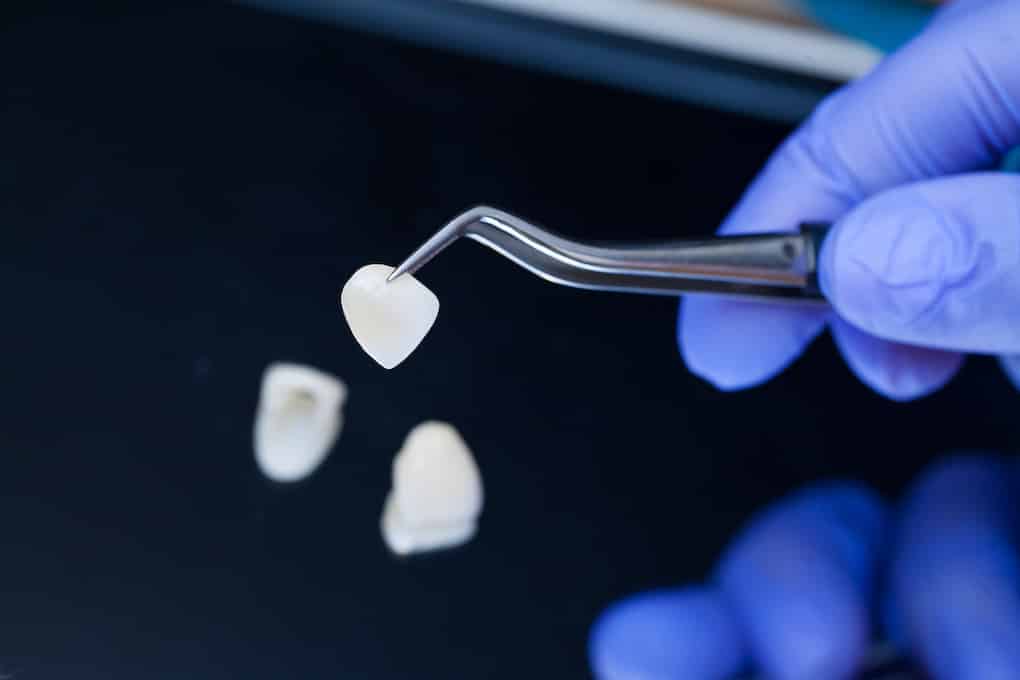Dental procedures are daunting, and we get it. There are just too many different procedures, and it’s hard to keep them all straight. Some of them hurt, and others take hours on end.
Veneers are no different. But today, we’re breaking down all things veneers, including:
- Cost of treatment
- Timeline
- Pros and cons
- And more
After today, you’ll know exactly what your dentist is talking about!
What Are Dental Veneers Exactly?
Dental veneers are the magic behind a perfect smile. They provide a new color, shape, and appearance for any number of teeth in your mouth by attaching a material to your tooth’s surface.
These veneers can be made of many different materials, and we’ll break down each of these common materials below.
When Are Dental Veneers Recommended?
Veneers are almost always recommended as a cosmetic dental procedure and rarely are “needed.” Sometimes, in the event of an accidental chipped or broken tooth, they can be used to help repair those teeth and provide the patient with a fresh smile.
We want everyone to be excited and happy with their smile, and that’s why we recommend veneers to anyone who doesn’t love their smile. It’s a very cost-effective way to provide you with a smile makeover.
5 Types of Veneers for Your Teeth
5 total materials have been developed to provide veneers for dental patients. These materials provide different benefits based on the patient’s needs and severity of need for an onlay.
Here are the types of veneers and their pros and cons.
1) Porcelain Veneers
Offering “the best” treatment and being one of the most popular veneer materials, porcelain has been a very common choice of dental patients for years. These ceramic veneers resist stains, are naturally tooth-colored, and last for a long time.
Porcelain veneers are a popular alternative to dental crowns and can help ensure that your mouth is well taken care of. Dental professionals will have 15 or more choices in material colors to match it accurately to your teeth.
Pros:
- Stain-resistant
- Similar texture to teeth
- Lasts for 10-15 years
- Low chance of being damaged
- Doesn’t injure gum tissue
Cons:
- Very expensive
- Requires enamel to be removed
- Hard to repair when damaged
Cost: Average of $1,500 per tooth
2) Composite Veneers
Composite is very similar to porcelain, but different materials provide a cheaper cost and faster installation. The downfall of these benefits is the shorter lifespan and higher chance of discoloration.
The same material that’s used for tooth-colored cavity fillings is what’s used for composite veneers. What is often lost when it comes to lifespan can be made up with the benefit of repairing chips in the veneer without the need for a full replacement.
Pros:
- Strong and chip resistant
- Lasts 5-10 years
- Smooth texture
- Easily repairable
- Can be applied in a single visit
Cons:
- Prone to discoloration
- Not as durable as porcelain
Cost: Average of $750 per tooth
3) Palatal Veneers (Palatal Onlays)
There are several names for palatal veneers, including lingual veneers and palatal onlays. These custom-built appliances are used to restore anterior teeth that have been damaged by dental erosion or other similar problems.
Palatal veneers are nearly as common because the patient often ignores them.
Pros:
- Perfect for anterior teeth
- Strong and long-lasting
- Improves bite and protects gums
Cons:
- Difficult procedure
- Often expensive
- Sometimes more than one visit is needed
Cost: The cost ranges greatly depending on how much damage is found.

4) Lumineers
Lumineers are a specific type of veneer used to help reshape your teeth. They’ve been specifically developed as an alternative to the traditionally popular porcelain veneer.
These veneers are extremely thin and can last for decades or more. But, while they last a long time, they can be more easily chipped, causing them to sometimes have a much shorter lifespan.
Pros:
- Less expensive than porcelain
- Requires minimal tooth preparation
- Reversible
- Last for nearly 20 years
Cons:
- Sometimes high chance of detachment
- Lower thickness can cause dark spots to come through
Cost: Average cost is between $800-$2,000
5) Removable or Temporary Veneers
Removable or temporary veneers are the snap-on solution to your problem. These less invasive, non-permanent, and cost-effective solutions provide many of the same benefits while still being easily removed.
When traditional veneers are added to your mouth, a portion of your enamel needs to be removed, making it an irreversible process. Temporary veneers might not last as well, blend in as well, or be uncomfortable, but they do provide you with a non-invasive and easily reversible decision.
Pros:
- Instant veneers for your mouth
- Can be easily removed
- Protect your teeth while waiting for a permanent solution
Cons:
- More fragile than other veneers
- Can be easily stained
- Can easily chip or crack
Cost: Averages range from $25-$1,000, depending on how long it should last.

Choosing the Right Veneers for Your Smile
All types of veneers for teeth provide a valuable benefit to your mouth to help you feel better about smiling. If you need any dental work, schedule an appointment with your local dentist and work through some options that might best serve you.
Here are some factors to consider while you’re looking for the right veneer solution for your smile:
- Tooth color
- Tooth shape
- Face shape
Your dentist will be able to guide you through the choosing process and likely give you several options based on the criteria above. When it comes to determining the type of veneer that you want for your mouth, consider the cost, length of life, and durability as factors that could sway your decision one way or the other.
The Dental Care That You Deserve
Dentistry doesn’t have to be intimidating or scary. Here at Wayzata Dental, we specialize in pain-free dentistry that prioritizes our patient’s comfort. The next time you need a veneer or dental treatment, choose Wayzata Dental and get the care you deserve.
Contact us today to schedule an exam or learn more about our cosmetic dental services.


